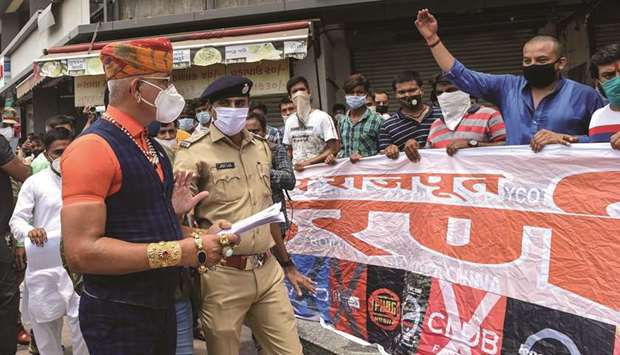US Secretary of State Mike Pompeo yesterday applauded India’s sweeping ban on Chinese apps including TikTok, saying New Delhi was ensuring its own security.
“We welcome India’s ban on certain mobile apps” from China, Pompeo told reporters in Washington, saying the move would “boost India’s integrity and national security.”
India on Monday banned 59 mobile apps with Chinese links on grounds they present a danger to the country’s national security, drawing a sharp rebuke from Beijing.
New Delhi’s decision came against the backdrop of an ongoing stand-off between Indian and Chinese forces in the Himalayan border region of Ladakh.
Clashes on June 15 left 20 Indian soldiers dead.
Besides TikTok other popular apps banned include WeChat, Shareit and BigoLive.
The Indian Information Technology Ministry said the apps were “prejudicial to the sovereignty and integrity of India, defence of India, security of state and public order.”
It said there were “raging concerns” about data security and safeguarding the privacy of 1.3bn Indians.
The ministry said it had received “many complaints from various sources” about apps that were “stealing and surreptitiously transmitting users’ data in an unauthorised manner.”
TikTok, owned by China’s ByteDance, allows users to upload and share short videos and is spectacularly popular in India - its 120mn users have made it the app’s top international market.
But TikTok on Tuesday denied sharing users’ data with the Chinese government.
The head of TikTok India issued a statement saying the firm has “not shared any information of our users in India with any foreign government, including the Chinese government”.
“Further if we are requested to in the future we would not do so,” Nikhil Gandhi said, adding that “hundreds of millions of users, artists, story-tellers, educators and performers...(depend) on it for their livelihood.”
It remains unclear how the bans would work.
But even Indians who already had downloaded TikTok on their phones were not able to use the app from late Tuesday.
l IANS adds: Entertainment app ZEE5 yesterday announced a short video-sharing platform HiPi in a bid to take on TikTok.
ZEE5 said it has partnered with over 300 creators initially to bring curated content on the platform which will be launched “within 30-60 days”.
“It is on beta right now. It will be live very shortly. It is undergoing user testing to refine the final nuances of how the application behaves. We are taking feedback from the close groups and making refinement to the product,” Rajneel Kumar of ZEE5 said.
HiPi will be first available for Android users before rolling out on iOS. The platform will be available within the ZEE5 which is “on a journey to build a super-app”.
ZEE5 already has original content, movies, fun kids content, live TV and news, music and games on the platform.
HiPi will be free for users as it will be an advertisement-driven platform, not subscription-based, Kumar said, adding that all data of users will be stored in the country.
“We have put a lot of emphasis on content moderation in order to build a safe environment,” he said.
The verified content creators on the platform will be able to share revenue on the basis of traction of their videos, he said.
HiPi will also have other social media features like the ability to “Follow” and “Like” content, Kumar said.
Meanwhile, Information and Technology Minister Ravi Shankar Prasad said yesterday that while Indians download a lot of apps from Google Play Store and Apple App Store, it is time to upload some.
Taking part in a virtual event to mark five years of the “Digital India” initiative, the minister encouraged Indian entrepreneurs to make products for the world.
“You know you have a supportive government. If any of you need any concrete help, do reach out,” he said, addressing the startup community in the country.
Moderated by YourStory founder and CEO Shradha Sharma, the event also saw the participation of Paytm fFounder and CEO Vijay Shekhar Sharma, Udaan co-founder Sujeet Kumar and InMobi founder and CEO Naveen Tewari, among others.
Tewari said that the decision to ban 59 Chinese apps may open up a once-in-a-lifetime opportunity for entrepreneurs to make India the fourth major digital hubs of the world, after the US, China and Russia.

The chief of Gujarat Rashtriya Rajput Karni Sena organisation, Raj Shekhawat (in turban), gestures as he arrives to participate in a protest against vendors selling Chinese products at a market in Ahmedabad yesterday.
